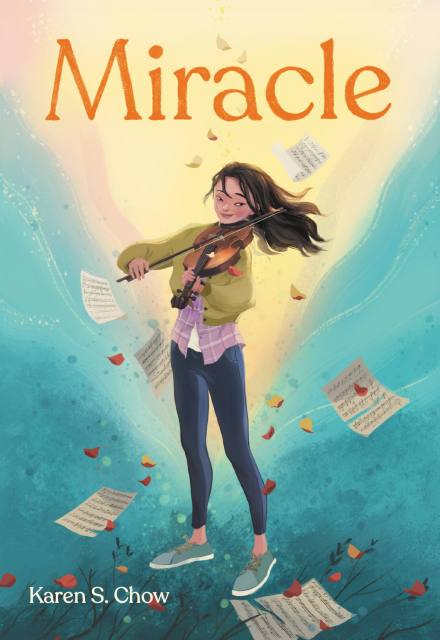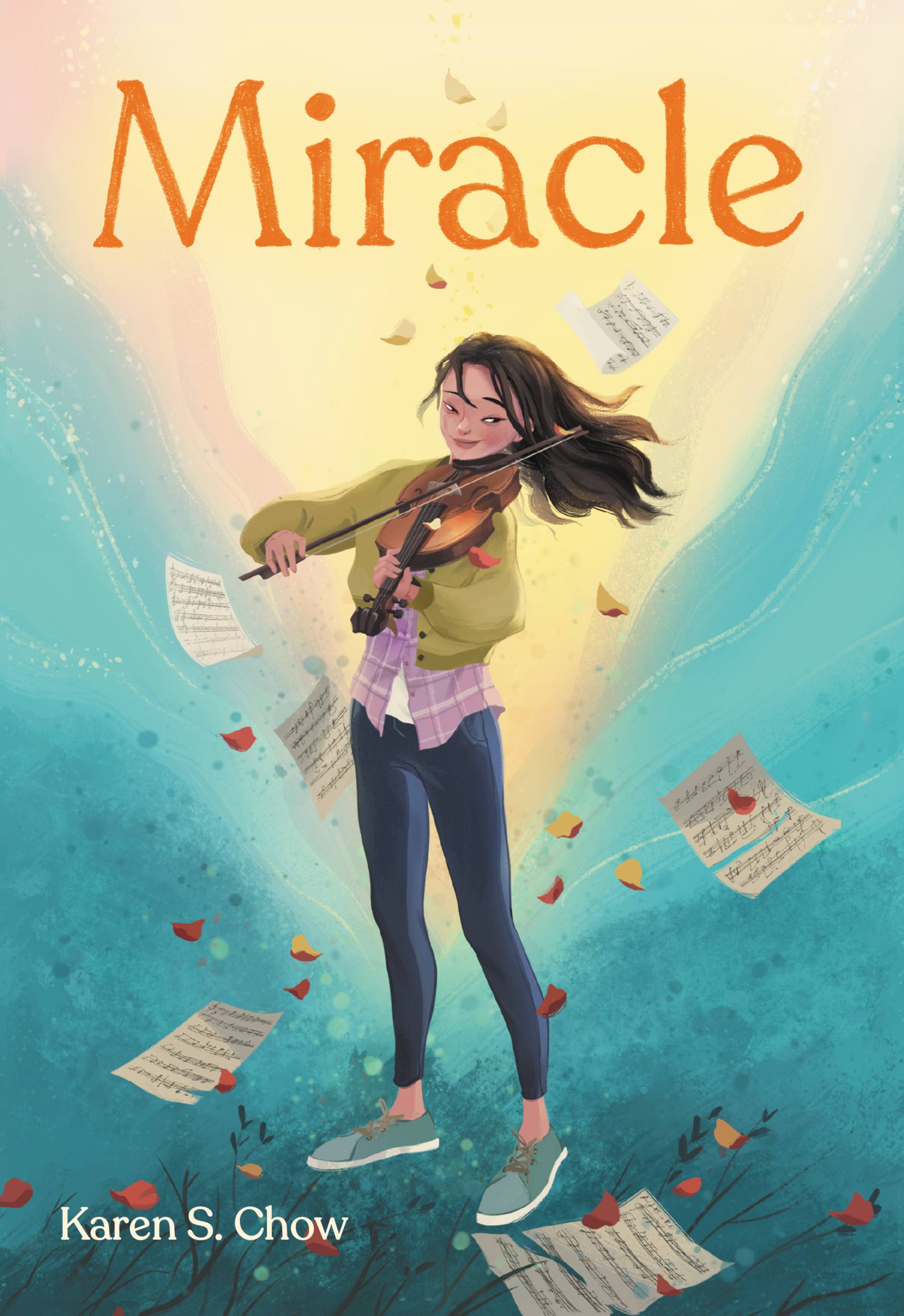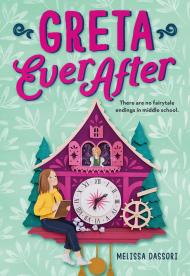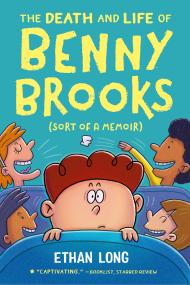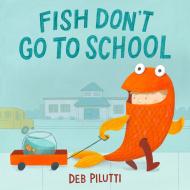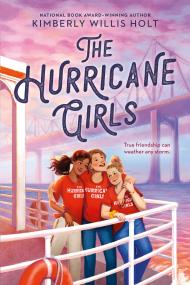By clicking “Accept,” you agree to the use of cookies and similar technologies on your device as set forth in our Cookie Policy and our Privacy Policy. Please note that certain cookies are essential for this website to function properly and do not require user consent to be deployed.
Miracle
Contributors
Formats and Prices
- On Sale
- Mar 28, 2023
- Page Count
- 256 pages
- Publisher
- Christy Ottaviano Books
- ISBN-13
- 9780316333726
Price
$16.99Price
$22.99 CADFormat
Format:
- Hardcover $16.99 $22.99 CAD
- ebook $9.99 $12.99 CAD
- Trade Paperback $8.99 $11.99 CAD
This item is a preorder. Your payment method will be charged immediately, and the product is expected to ship on or around March 28, 2023. This date is subject to change due to shipping delays beyond our control.
Buy from Other Retailers:
A glittering story about life and loss that follows Amie as she learns to heal and move forward over the course of a life-changing year, for fans of When You Trap a Tiger and The Remarkable Journey of Coyote Sunrise.
Amie has spent her life perfectly in tune with Ba-ba, her father—she plays the violin, his favorite instrument; she loves all his favorite foods, even if he can’t eat them during his cancer treatments; and they talk about books, including Amie’s favorite series, Harry Potter. But after Ba-ba dies, Amie feels distanced from everyone close to her, like her mother and her best friends, Rio and Bella.
More devastating still, she loses her ability to play the violin—the notes that used to flow freely are now stilted and sharp. Will Amie ever find her way back to the music she once loved? With hope and harmony lighting the way—and with help from the people who care about her most—Amie must find the strength to carry on. In the end, she’ll learn that healing, while painful, can be its own miraculous song.
Advance Praise for Miracle: “A beautifully written debut about family, friendship, and life after loss. Miracle will be a miracle for the readers who need it.” —Dusti Bowling, bestselling author of Insignificant Events in the Life of a Cactus and The Canyon’s Edge “A symphony of loss and healing that’s certain to tug at your heartstrings.” —Cindy Baldwin, author of Where the Watermelons Grow “Genuine, sincere, authentic—this book is a gift to readers.” —Mary E. Lambert, author of Family Game Night and Other Catastrophes “A touching book about a difficult subject. It brings a quiet hope to young readers who may be dealing with their own loss, showing that they can find a path forward even after the hardest events.” —Melissa Dassori, author of J.R. Silver Writes Her World
A CCBC BEST BOOK OF THE YEAR “A moving, musical interlude on grief … a great pick for anyone with a love of music or with a cloud of grief lingering over them. Hand to fans of Lynne Kelly, Christine Day, and Paul Acampora.” —Booklist “Bolstered by an undercurrent of hope, Chow honors the tween protagonist’s complexities and priorities as explored via Amie’s candid voice.” —Publishers Weekly “This lyrical narrative weaves in musical elements to effectively describe the complexity of Amie’s grief and its effects on her love for music.” —BCCB “Perfect for middle school music nerds, especially those undergoing personal turmoil.” —School Library Journal
-
Praise for Miracle:Booklist
A CCBC Best Book of the Year
A Grand Canyon Reader Award Winner
"A moving, musical interlude on grief, Chow’s debut novel wraps readers in the moments Amie shares with her ba-ba, who has cancer.... Well-paced and serious without being overly heavy, Chow’s debut is a great pick for anyone with a love of music or with a cloud of grief lingering over them. Hand to fans of Lynne Kelly, Christine Day, and Paul Acampora." -
"Bolstered by an undercurrent of hope, Chow’s unflinchingly raw debut explores the fraught relationship between a grieving daughter and mother during a father’s decline and death from cancer.... Portraying variations on grief experiences amid a community slowly adjusting after a shared loss, Chow honors the tween protagonist’s complexities and priorities as explored via Amie’s candid voice. Auditory imagery, Harry Potter references, and nods to the Chinese American family’s cultural expression ground the narrative, while chapter epigraphs define music theory metaphors."Publishers Weekly
-
"This lyrical narrative weaves in musical elements to effectively describe the complexity of Amie’s grief and its effects on her love for music...fans of When You Trap a Tiger will find this poignant middle grade novel valuable."BCCB
-
"Grief is part of life, but difficult to pin down in writing. Chow adeptly accomplishes that, in addition to presenting the tumult of puberty, a recipe for explosive emotions. Along with encapsulating loss, this work is at its best when discussing music: the emotional response, the dedication to practice, the euphoria when a piece clicks. Each chapter begins with a musical term and definition, a neat and informative Easter egg. Perfect for middle school music nerds, especially those undergoing personal turmoil."School Library Journal
-
"A beautifully written debut about family, friendship, and life after loss. Any reader who's lost a loved one will be able to relate to and find comfort in Amie's story. Miracle will be a miracle for the readers who need it."Dusti Bowling, award-winning, bestselling author of Insignificant Events in the Life of a Cactus and The Canyon's Edge
-
"Told in lyrical, heartfelt prose, Miracle weaves a symphony of loss and healing that’s certain to tug at your heartstrings."Cindy Baldwin, author of Where the Watermelons Grow
-
"Genuine, sincere, authentic—this book is a gift to readers. It is a story about life and loss and—most of all—hope."Mary E. Lambert, author of Family Game Night and Other Catastrophes
-
"Will have readers appreciating the miracle of love, grief, and learning to live again."Amanda Rawson Hill, author of The Hope of Elephants
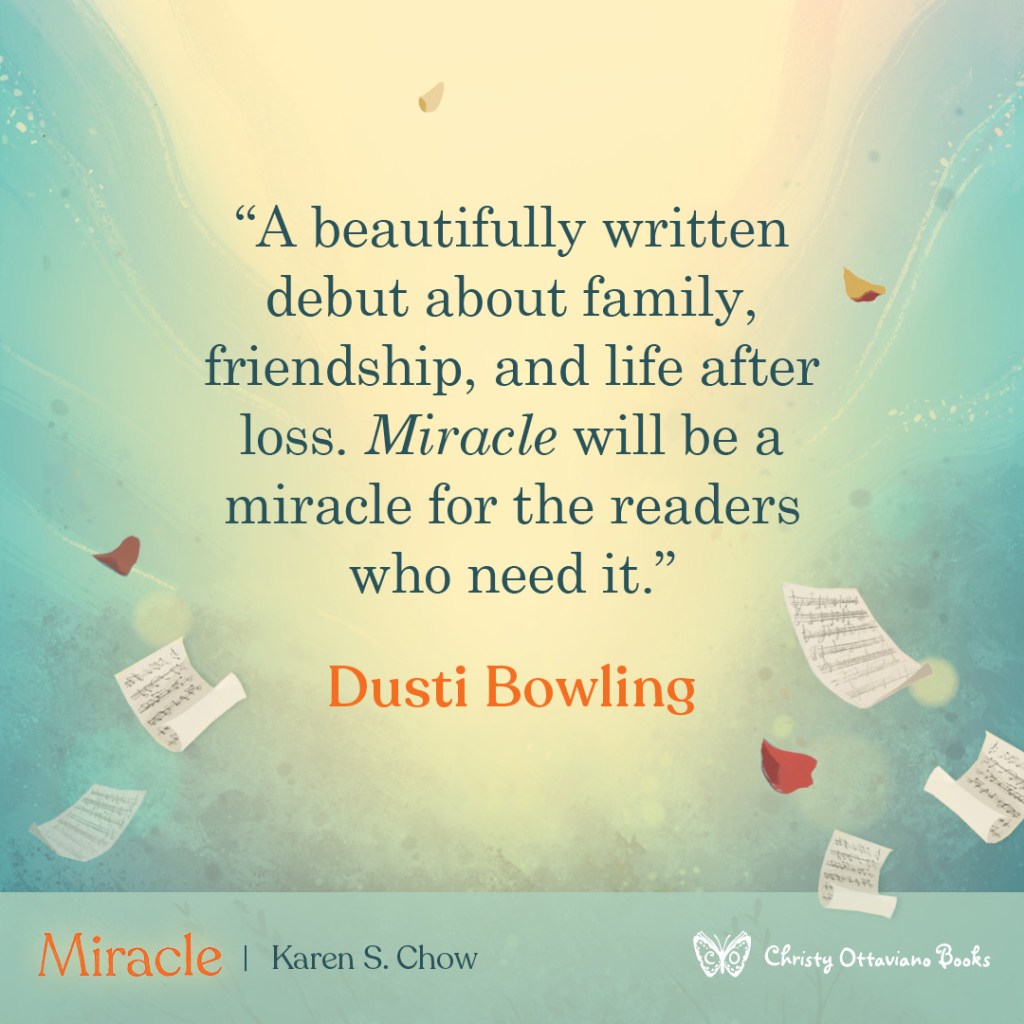


Praise
-
Praise for Miracle:Booklist
A CCBC Best Book of the Year
A Grand Canyon Reader Award Winner
“A moving, musical interlude on grief, Chow’s debut novel wraps readers in the moments Amie shares with her ba-ba, who has cancer…. Well-paced and serious without being overly heavy, Chow’s debut is a great pick for anyone with a love of music or with a cloud of grief lingering over them. Hand to fans of Lynne Kelly, Christine Day, and Paul Acampora.” -
“Bolstered by an undercurrent of hope, Chow’s unflinchingly raw debut explores the fraught relationship between a grieving daughter and mother during a father’s decline and death from cancer…. Portraying variations on grief experiences amid a community slowly adjusting after a shared loss, Chow honors the tween protagonist’s complexities and priorities as explored via Amie’s candid voice. Auditory imagery, Harry Potter references, and nods to the Chinese American family’s cultural expression ground the narrative, while chapter epigraphs define music theory metaphors.”Publishers Weekly
-
“This lyrical narrative weaves in musical elements to effectively describe the complexity of Amie’s grief and its effects on her love for music…fans of When You Trap a Tiger will find this poignant middle grade novel valuable.”BCCB
-
“Grief is part of life, but difficult to pin down in writing. Chow adeptly accomplishes that, in addition to presenting the tumult of puberty, a recipe for explosive emotions. Along with encapsulating loss, this work is at its best when discussing music: the emotional response, the dedication to practice, the euphoria when a piece clicks. Each chapter begins with a musical term and definition, a neat and informative Easter egg. Perfect for middle school music nerds, especially those undergoing personal turmoil.”School Library Journal
-
“A beautifully written debut about family, friendship, and life after loss. Any reader who’s lost a loved one will be able to relate to and find comfort in Amie’s story. Miracle will be a miracle for the readers who need it.”Dusti Bowling, award-winning, bestselling author of Insignificant Events in the Life of a Cactus and The Canyon's Edge
-
“Told in lyrical, heartfelt prose, Miracle weaves a symphony of loss and healing that’s certain to tug at your heartstrings.”Cindy Baldwin, author of Where the Watermelons Grow
-
“Genuine, sincere, authentic—this book is a gift to readers. It is a story about life and loss and—most of all—hope.”Mary E. Lambert, author of Family Game Night and Other Catastrophes
-
“Will have readers appreciating the miracle of love, grief, and learning to live again.”Amanda Rawson Hill, author of The Hope of Elephants
